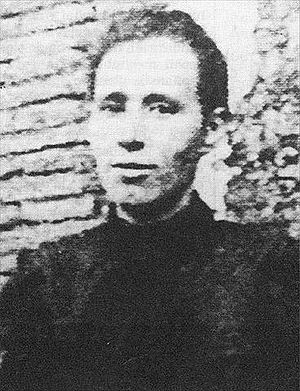Virginia Bolten facts for kids
Quick facts for kids
Virginia Bolten
|
|
|---|---|

Photo of Virginia Bolten
|
|
| Born | 26 December 1870 San Luis, Argentina or possibly San Juan
|
| Died | 1960 (aged 89–90) Montevideo, Uruguay
|
| Occupation | Journalist, activist |
| Known for | publishing anarchist newspapers, organizing first May Day demonstration in South America |
Virginia Bolten (born December 26, 1870 – died 1960) was an important Argentine journalist and activist. She believed in anarchism, which means people should live freely without a government, and feminism, which means women should have equal rights. Virginia was a great speaker and helped lead the fight for women's rights in Argentina. In 1902, she was sent to live in Uruguay, where she stayed until she passed away.
Contents
Who Was Virginia Bolten?
Virginia Bolten was born in Argentina in 1870. Her father was from Germany. She grew up in San Juan and then moved to Rosario when she was 14. As an adult, she worked making shoes and in a sugar factory.
While working as a shoemaker, she met Juan Marquez, who helped organize shoe workers. They later got married. She also met Pietro Gori, which led her to join groups that believed in anarchism and women's rights. Because of her activism, she was sent to Uruguay in 1902 under a law called the Residence Law.
What Did Virginia Bolten Do?
Virginia Bolten was very active in fighting for workers' and women's rights.
Starting Newspapers
In 1888, Virginia helped publish The Working Baker of Rosario (Spanish: El Obrero Panadero de Rosario). This was one of the first newspapers in Argentina that supported anarchist ideas.
Later, she was likely in charge of a newspaper called La Voz de la Mujer (English: The Woman's Voice). This paper was published in Rosario nine times between 1896 and 1897. It briefly started again in 1901. Another paper with the same name was published in Montevideo after she moved there. This suggests she might have started and edited that one too.
In Uruguay, Virginia continued her work. She published another newspaper called La Nueva Senda (English: The New Path) from 1909 to 1910.
Organizing Strikes and Protests
In 1889, Virginia organized a protest and strike for women who worked as seamstresses in Rosario. This was probably the first strike by female workers in Argentina.
In 1890, Virginia Bolten, Romulo Ovidi, and Francisco Berri were key organizers of the first May Day demonstrations in Argentina. May Day is a day to celebrate workers' rights. The day before the protest, she was stopped by police for handing out flyers outside factories.
During the May Day demonstrations, Virginia led thousands of workers marching to Plaza Lopez in Rosario. She carried a red flag that said, "First Of May - Universal Fraternity - The workers of Rosario comply with the provisions of the International Workers Committee of Paris-" (Spanish: Primero de Mayo - Fraternidad Universal; Los trabajadores de Rosario cumplimos las disposiciones del Comité Obrero Internacional de París).
After she was sent to Uruguay, she kept up her activism in Montevideo, the capital city.
Virginia Bolten's Legacy
Virginia Bolten is remembered for her important contributions to women's and workers' rights.
A Park in Her Honor
A park in Puerto Madero, a part of Buenos Aires, is named after Virginia Bolten.
A Film About Her Life
In 2007, the government of the San Luis Province in Argentina helped fund a film about Virginia Bolten. The movie focuses on her life, her beliefs in anarchist feminism, and the reasons why La Voz de la Mujer newspaper was created.
The film is called No god, No master, no husband (Spanish: Ni dios, ni patrón, ni marido), which was one of the newspaper's slogans. Actress Julieta Díaz plays Virginia Bolten in the film. The movie was released on April 29, 2010, in Argentina and was directed by Spanish director Laura Mañá.
See also
 In Spanish: Virginia Bolten para niños
In Spanish: Virginia Bolten para niños
 | Dorothy Vaughan |
 | Charles Henry Turner |
 | Hildrus Poindexter |
 | Henry Cecil McBay |

